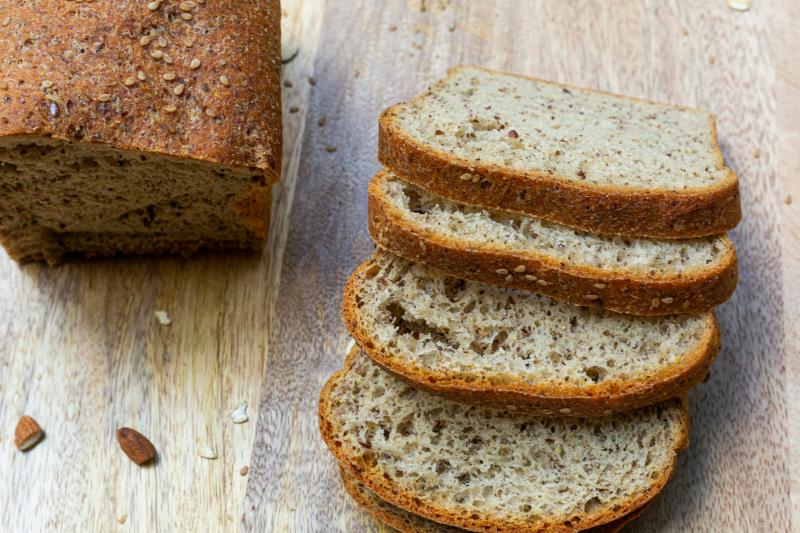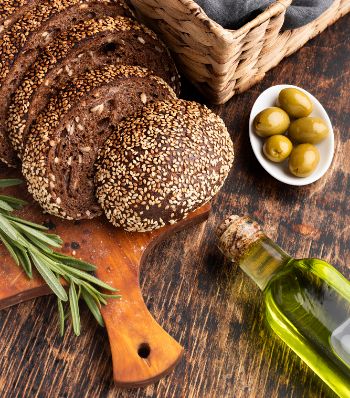


Bread is traditionally one of the most carbohydrate-rich staple foods. However, traditional bread is prohibited for those following a low-carb or ketogenic vegan diet. Not to worry, plenty of satisfying and nutritious bread alternatives are low in carbs. This guide reviews the best low-carb bread options to enjoy as part of a plant-based lifestyle.
This post will also explore bread options that are low in net carbs. We will provide recipes for making low-carb vegan bread at home and recommend store-bought brands. By the end, you will have plenty of ideas to satisfy your bread cravings while staying on track with your dietary goals.
Finding suitable alternatives to bread can be challenging for individuals following a plant-based, low-carb diet. Traditional wheat breads are high in carbohydrates, and most commercial breads contain dairy. However, with a little creativity, there are numerous delicious low-carb bread recipes and brands to enjoy.
For some, a low-carb vegan diet provides the ideal combination of plant-based health advantages and weight control. Reducing carbohydrates can help promote a healthy metabolism and sustainable weight loss.
A vegan diet, which includes a diverse range of nutrient-dense vegetables, fruits, legumes, and whole grains, has been proven to reduce the risk of developing chronic diseases when carbohydrates are sourced from high-quality sources. A low-carb vegan lifestyle fulfills all the criteria for individuals prioritizing ethics and wellness.
These breads are a must-try for anyone seeking a healthier alternative.
Maintaining a healthy sugar balance without grains.
High protein and fiber intake from nutritious sources.
Convenient sandwich, wrap, and snack options for on-the-go consumption.
Enjoyable textures without gluten or dairy.
Because of the gluten and grains, traditional wheat breads are typically high in net carbs. Most standard slices of bread contain approximately 30g of net carbs per serving. By contrast, the options explored in this guide will provide 15g or fewer net carbs per serving. Here is a breakdown of their nutritional differences.
Protein: These breads obtain protein from nut flour, such as almond flour, rather than wheat gluten. This slightly increases the protein levels.
Fiber: Fiber levels often increase due to the inclusion of ingredients such as coconut flour and chickpea flour. This helps to slow down the digestion of carbohydrates.
Fats: These include healthier sources of nutrition such as coconut, nuts, and seeds. Seeds compensate for the absence of gluten and grains. This makes the macros more balanced.
Calories: On average, these breads have around 100 fewer calories per serving than conventional bread breads due to the carb reduction in carbohydrates.

Weight Management: Reducing carb intake from bread and substituting it with higher fiber, protein, and fat ingredients can help promote satiety and support weight loss or maintenance goals.
Heart Health: Choosing seed-based slices of bread allows for substituting carbs, carbohydrates, and beneficial fats like those found in almonds and coconuts, such as monounsaturated oils. This reduces the risk of heart disease.
Blood Sugar Stability: The fiber, fat, and protein in these foods contribute to a slower release of carbohydrates, which helps maintain stable energy levels, as opposed to the sudden spikes caused by bread. Good for people with diabetes.
Gut Health: Ingredients such as chia and nuts nourish and support the microbiome. Higher fiber strains also help eliminate waste for smoother digestion.
No Gluten Sensitivity: Due to gluten sensitivity, many people experience gas or inflammation when consuming traditional breads. These recipes address the issue of protein deficiency.
Nutrient Density: Almonds, seeds, and coconut add additional antioxidants, vitamins, minerals, and phytonutrients that are not typically found in regular bread, providing better cellular protection.
Ethics: A vegan diet adheres to principles of sustainability, environmentalism, and animal welfare by entirely avoiding meat, dairy, and eggs, including bread.
This bread makes nutritious substitutions to support long-term, vibrant health, thanks to carefully combined whole food ingredients. Your body and conscience will feel good!
Breakfast sandwiches: Stuff slices of bread with tofu or veggie sausage patties, scrambled eggs, spinach, and tomato.
Avocado toast: Mash avocado onto toast and sprinkle with Everything but the Bagel seasoning or nutritional yeast.
Bruschetta: Chop tomatoes, garlic, basil, and olive oil, then spoon the mixture onto grilled bread.
Grilled cheese: Melt vegan cheese between two slices of bread and serve with a side salad.
French toast: Soak bread in a mixture of oat milk, egg replacement, and cinnamon for a decadent breakfast.
BLT: Pile bread high with vegan plant-based lettuce, tomato, and vegan mayo.
Open-faced veggie melts: Place sautéed veggies and vegan cheese on top of bread slices and broil until the cheese is melted.
Panini: Stuff bread with marinara sauce, vegan sausage, and sautéed peppers, then press in a panini press.
Soup and salad: Enjoy a hearty veggie soup or a side salad with bread for a satisfying meal.
Sandwiches: Fill bread with hummus, avocado, nut butter, or vegan lunch meat such as turkey.
Pizza Toast: Top Spread sauce on top of bread, add cheese and veggies, and then for a quick meal.
Getting creative enables you to savor traditional meals and snacks in a whole-food, plant-based manner.
At Low Carb Avenue, we take pride in creating bread that tastes delicious and nourish your overall well-being. When developing our recipes, we identified the most nutrient-dense ingredients and determined the optimal macronutrient profile required to provide customers sustained energy throughout the day.
Our simple ingredient list allows intrinsic nutrition to shine by foregoing unnecessary additives. High-quality almond and chickpea flours provide sustained satiety with 7g of complete protein per serving. We chose inulin fiber derived from nutritious chicory root for a natural sweetness that helps prevent blood sugar spikes.
Additionally, we focus on removing obstacles that prevent customers who follow specialty diets from enjoying delicious, homemade bread—our significantly reduced carbon footprint results from our commitment to sustainable sourcing, which benefits communities and ecosystems.
Ultimately, we believe that dietary habits should improve both physical health and mental well-being. By incorporating dried figs or pumpkin seeds into our loaves, we aim to provide delight and nourishment. Whether starting your day or enjoying it with loved ones, we hope that Low Carb Avenue bread evokes the same feelings of comfort and joy that motivated us to begin this journey.
Conclusion
Ultimately, low-carb vegan breads prove you don’t have to miss out on comfort foods to feel your best. Whether you’re whipping up recipes at home or finding tasty pre-made options, these breads demonstrate how small changes can significantly impact your well-being.
Beyond reducing calories or carbohydrates, they provide your body with essential nutrients that energize your day. And let’s not even get started on the incredible flavors – it’s like indulging in a delectable delight! How amazing is a fluffy loaf packed with seeds, cocoa, and bananas?
It sure beats a boring sandwich any day. Choosing these breads is an easy lifestyle adjustment supporting your health and values. So go ahead and start baking or shopping; your mind, energy, and smile will thank you!








Sign up below to receive exclusive deals and be first to know when delicious new products are coming out.